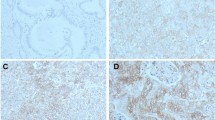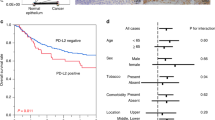Abstract
Preoperative staging of gastric cancer is difficult. Several molecular markers associated with initiation and progression of cancer seem promising for obtaining preoperative prognostic information. To investigate whether these markers are indicative especially for the presence of lymph node metastases in patients with gastric cancer, we have examined primary tumour specimens from 105 patients with primary adenocarcinoma of the stomach entered in a surgical trial. In this trial, lymph node status was determined by strictly quality-controlled lymph node dissection and examination. The selected markers were growth regulators (p53, Rb and myc), metastasis-suppressor gene product (nm23), adhesion molecules (Ep-CAM, E-cadherin, CD44v5 and CD44v6) and urokinase-type plasminogen activator (u-PA). Also, the amount of eosinophilic and lymphocytic infiltrates available post-operatively was analysed with respect to its prognostic value for lymph node status. Moreover, the association of these parameters with survival and disease-free period (DFP) was evaluated. Of all molecular markers investigated, only Rb expression had a significant association with the presence of lymph node metastasis in both univariate and multivariate analysis. For curative resectability, a significant association was found with Rb and E-cadherin expression, while in multivariate analysis Rb and myc were selected as the combination with additional independent prognostic value, and E-cadherin had no additional independent value. For overall survival in univariate analysis, the amount of both eosinophilic and lymphocytic infiltrates and Rb and myc expression were of significant prognostic value. Only the amount of lymphocytic infiltrate had a prognostic significance for DFP. In stepwise multivariate analysis, TNM stage (I + II) and marked lymphocytic infiltrate were associated with better overall survival and longer DFP. We conclude that, if these results are confirmed in a larger series of patients, molecular markers can provide useful prognostic information.
This is a preview of subscription content, access via your institution
Access options
Subscribe to this journal
Receive 24 print issues and online access
$259.00 per year
only $10.79 per issue
Buy this article
- Purchase on Springer Link
- Instant access to full article PDF
Prices may be subject to local taxes which are calculated during checkout
Similar content being viewed by others
Author information
Authors and Affiliations
Consortia
Rights and permissions
About this article
Cite this article
Songun, I., van de Velde, C., Hermans, J. et al. Expression of oncoproteins and the amount of eosinophilic and lymphocytic infiltrates can be used as prognostic factors in gastric cancer. Br J Cancer 74, 1783–1788 (1996). https://doi.org/10.1038/bjc.1996.630
Issue Date:
DOI: https://doi.org/10.1038/bjc.1996.630
This article is cited by
-
A new dawn for eosinophils in the tumour microenvironment
Nature Reviews Cancer (2020)
-
Adiponectin receptors are downregulated in human gastric cancer
Journal of Gastroenterology (2010)
-
Effect of tumor infiltrating lymphocyte on local control of rectal cancer after preoperative radiotherapy
Chinese Journal of Cancer Research (2008)
-
Loss of Ep-CAM (CO17-1A) expression predicts survival in patients with gastric cancer
British Journal of Cancer (2005)
-
Influence of pathological tumour variables on long-term survival in resectable gastric cancer
British Journal of Cancer (2002)



